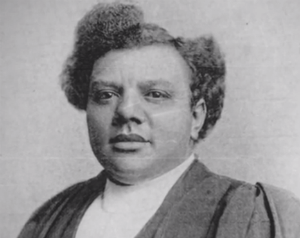
The Revd Peter Thomas Stanford was born on a plantation in Virginia and kidnapped by Native Americans. But from these unpromising beginnings he would go on to become an educated and respected justice campaigner who crossed the Atlantic and thrived in Birmingham as minister of Highgate Baptist Church.
His story, with echoes of the Oscar-winning film
12 Years a Slave, has now been made into a
short film by History West Midlands (HWM), an independent organisation focusing on the history of the people of the area. HWM documented Stanford’s life after his name was added to the Oxford Dictionary of National Biography. The resulting five-minute feature contains a contribution from Stanford’s successor and Highgate’s current minister the Revd Dr Paul Walker.
‘To think that back in the 1890s an African American ex-slave was the minister of a white working class church is quite moving and profound,’ said Dr Walker.
Peter Stanford spent the first years of his life on a plantation, but was kidnapped by Native Americans following the abolition of slavery at the end of the US Civil War. He was subsequently adopted by a Mr Stanford – where he received his name – but ran away after being mistreated. He met a Presbyterian minister who treated him well and assisted his pursuit of education. This resulted in going to Suffield College where he was converted to Christianity.
He was given work as a missionary to the black community in Hartford, Connecticut and became a Baptist minister before moving to Canada. He came to Britain in 1883 to raise money for his church, but would settle here for the next 12 years.
After moving around England he was attracted to Birmingham, and in 1889 received the call from the Baptist church in Hope Street.
He faced some major obstacles in his ministry, but would become a well-known public figure in the city. His talks at the town hall were always attended by many dignitaries. Under his leadership the church grew, having flourishing schools and organisations. When he retired the church presented him with a valuable gold watch.
Stanford was a well-educated man and wanted his race to benefit from the blessings of education and religion which he had himself received. He resolved to set up an institution to train black men and women to be missionaries in Africa. He returned to the US in 1895, and died of kidney failure there in 1909.
‘Stanford crossed boundaries of race and class,’ said Dr Walker. ‘He crossed the Atlantic. He was a very significant person in terms of bringing disparate people together.’
He added, ‘There is a large picture of him at the back of the church. Occasionally I look at it and am stunned to think that guy walked the streets I walk and was committed to the same things. It is a privilege to be the minister of the same church.’